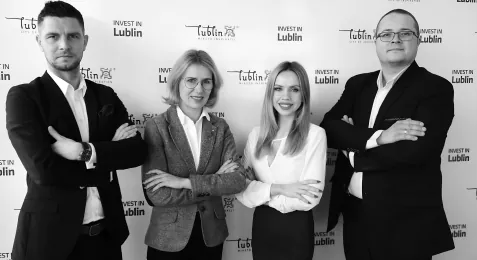Lublin Info Centre
Lublin IT education levels up!

Lublin stands as a hub of innovation and emerging technologies. For over a decade, we’ve attracted a diverse array of IT specialists, startups, and investors. The flourishing development within this sector underscores the efficacy of educating our youth in these domains. Nurturing skills and competencies in computer science and telecommunications among students holds significant weight in guiding their future career paths. Our consistent support for various initiatives reflects our commitment to positioning Lublin as a pivotal technological centre on Poland’s map, remarks Krzysztof Żuk, Mayor of Lublin.
The “Lublin – Educational Future of IT” pilot project extends comprehensive support to municipal schools in their computer science endeavours. Engaging 13 primary schools, 8 high schools, and 7 vocational institutions in Lublin, the program entails training over 60 educators and empowering 4100 students with digital competencies. These competencies encompass programming skills, fundamental knowledge of artificial intelligence, and principles governing safe cyber practices. The program injects tools, methodologies, and content into schools to ensure top-tier computer education for all students, coupled with support for teachers. All activities will align with the prescribed curriculum guidelines during compulsory computer science lessons.
Polish programmers and cybersecurity experts enjoy a stellar reputation globally. I’m confident that initiatives akin to the one in Lublin will inspire and equip individuals for careers in the telecommunications sector, offering unparalleled opportunities for those endowed with talent, said Przemysław Kuna, Deputy Director of NASK and Director of the National Educational Network.
The project envisages leveraging the CyberSkiller educational program, tailored to the curriculum, alongside an interactive suite of computer science tasks and subjects. A comprehensive range of 48 courses, spanning 480 hours of instruction, is available on the platform. This includes 160 hours of coursework for primary school students, 160 hours for high school students at both basic and advanced levels, and over 200 hours for vocational school students, focusing on qualifications pertinent to the IT technician and programmer roles.
The program, spearheaded by a didactic team under the substantive guidance of Barbara Halska, Teacher of the Year and co-author of the computer science curriculum, in collaboration with the Digital Dialogue Association, underscores its commitment to enhancing IT education accessibility. Emphasizing inclusivity, the CyberSkiller program furnishes students with access to content and tasks centred around practical skills, thereby fortifying their readiness for the job market.
Modern education necessitates the creation of a flexible and engaging pedagogical environment, placing the student at the forefront. CyberSkiller has crafted courses and tools for teaching computer science that alleviate administrative burdens for teachers and aid in tailoring instruction to individual student needs. Our aim is to leverage technology for repetitive tasks, thereby affording genuine and valuable educational interactions between teachers and students. We’re thrilled to implement our ideas in the very domain where our journey in the IT industry commenced, expressed Bogdan Księżopolski, President of CyberSkiller and professor at the Leon Koźmiński Academy.
The program is slated to commence in the current academic year and will span two semesters, concluding in the middle of the 2024/2025 academic year. In addition to acquiring new IT competencies, students will partake in the Lublin IT League competition, collaborating with peers to solve advanced tasks. Furthermore, computer science teachers will engage in training sessions conducted by the Digital Dialogue Non-Public Teacher Training Center, focusing on teaching methodologies aimed at fostering IT skills and social competencies such as communication and teamwork. Teachers will also partake in an ambassador program and coaching training.
As part of the project’s scope, scientific endeavours will be undertaken to gauge cybersecurity awareness levels within the school environment and evaluate the efficacy of novel teaching methodologies. These findings will culminate in a comprehensive report slated for release in 2024.







